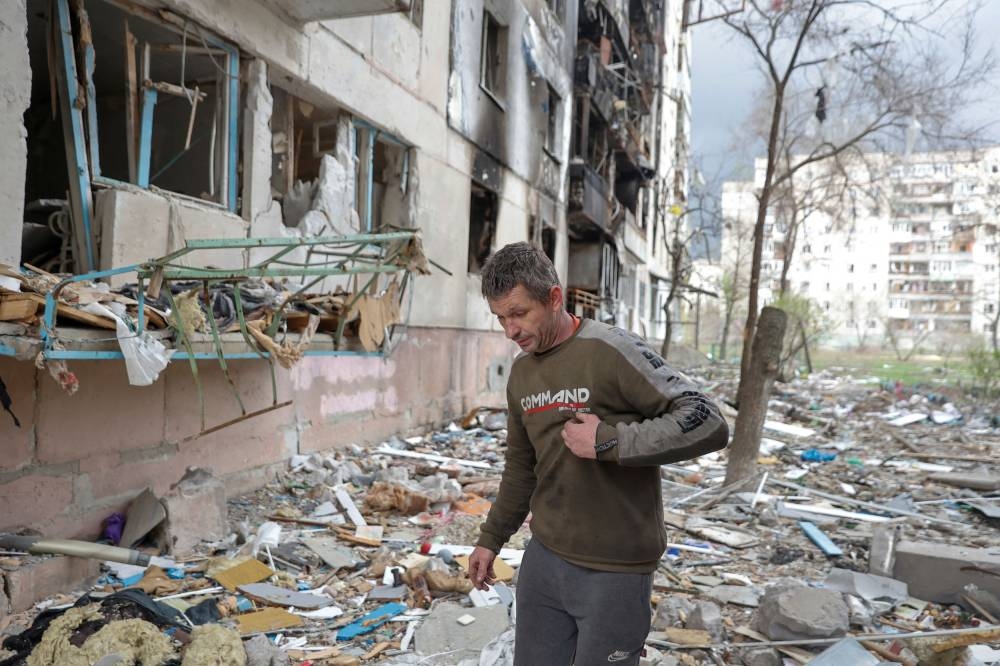
PARIS, June 2 — The 100 days since Russia launched its invasion of Ukraine have seen Europe destabilised, the global economy weakened, and the world order turned upside down.
But Russian President Vladimir Putin remains in power and despite the battering of the Russian economy and failures of the military campaign shows no sign of stepping back.
Here AFP looks at what has changed since February 24 — and what has not.
Putin pariah
Before Russia launched the invasion, Putin was a frequent if prickly interlocutor with Western capitals. French President Emmanuel Macron even hosted him in his holiday residence in the summer of 2019.
But now Western leaders without hesitation describe him as a “dictator” and a “war criminal” with the Russian leader isolated and his henchmen like Foreign Minister Sergei Lavrov — once a frequent visitor to the West — sanctioned.
Yet within his own country, despite persistent unconfirmed rumours concerning his health and disgruntlement within the inner circle, Putin appears to maintain control for now and even have support for the war against Ukraine.
Maps torn up again
Russia failed in its initial aim for a lightning offensive that would have taken control of Kyiv, encountering far greater Ukrainian resistance than the Kremlin anticipated.
But even now, Russian forces are entrenched deep inside Ukrainian territory, with Moscow determined to seize all of the largely Russian-speaking eastern Donbas region.
Russia has undertaken such flagrant redrawing of maps before, with its 2014 annexation of the Ukrainian Black Sea peninsula of Crimea, never recognised by the international community.
And with Putin still in no hurry to withdraw, it remains unclear what his ultimate aims could be.
If the Donbas falls, Ukraine’s strategic port of Odessa to the west could be in the “line of fire”, the geographer and former diplomat Michel Foucher told AFP.
“The period that is beginning is not favourable to the Ukrainians,” he said.
Russian alliances
But while the EU, UK and US have proved relatively united — despite differences in strategy — on the need to pressure Russia, this stance has by no means been shared worldwide.
China has never explicitly condemned the Russian offensive and Moscow has seized on its isolation by the West to build up Beijing-Moscow links, historically a fraught relationship going back to Soviet times.
India, one of Russia’s key global allies especially in arms sales, has been equally circumspect.
And President Recep Tayyip Erdogan of Turkey, a Nato member, has been careful not to wreck ties with Moscow even as Ukraine uses Turkish drones.
Steven Gruzd, head of the African Governance and Diplomacy Programme at the South African Institute of International Affairs, said most countries among the BRICS groups of emerging economies had been “very reluctant” to condemn the invasion.
“I think in Africa there are some countries which say they want to remain neutral like South Africa but that is interpreted as supporting Russia in the situation,” he said.
A different Nato
Before February 24, the question of Nato membership in non-aligned EU members Finland and Sweden was far from being top of the political agenda in the Nordic nations.
But now both Finland, which has a land border with Russia, and Sweden, whose Baltic maritime rivalry with the country dates back centuries, have both filed applications to join Nato.
Meanwhile, the United States and European allies have sent thousands more soldiers to help protect Nato borders with Russia in Poland and the Baltic states.
All this is contrary to Putin’s stated war aim of protecting Russia from Nato’s reach. It has also pushed Macron’s vision of the EU taking responsibility for its own security up the agenda again.
World-impacting sanctions
Western powers agreed the most severe sanctions ever against Russia, seeking to cut it off from much of the world economy as well as hurt Putin politically.
But the restrictions also risk hurting consumers outside Russia. Russia is a major global grain supplier and Europeans still rely on its energy supplies. The EU has agreed a limited ban on Russian oil, but gas would mark another step.
The effects of the war are being felt around the world, impacting economic growth, supply chains and the food and energy sectors. It has raised fears of a food crisis, particularly in North African countries dependent on Russian imports, said Gruzd.
“Who knows what particular effects this may have: it may be uprisings, it may be protests. So even though this is happening very far away, in this interconnected world, it is being felt very definitely in the global South,” he added. — AFP